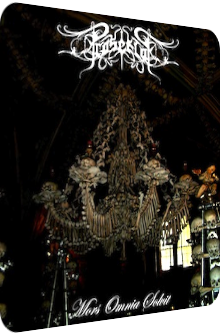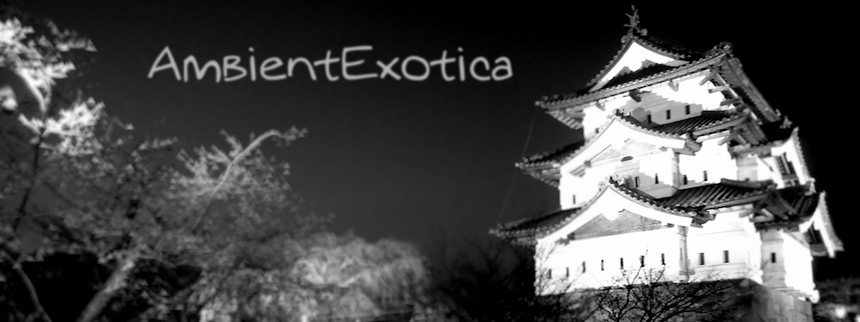
Prosektor
Mors Omnia Solvit
2012
I don't know why I am doing this. Yes, I am a fan of mellow, brightly colored Ambient music. Well, look at the front cover above. Now back to the description. There's an utter discongruence in terms of my preference and the offered material by Attila Iváncsik's Dark Ambient project Prosektor, hailing from Nyiregyhaza, Hungary. But that's one of the few strange habits of our modern society: since we cannot experience real danger anymore and have left the raw coincidental forces of nature long time ago, we either long for the things we've lost by listening to field recordings and Ambient music that is in close touch to nature, or we are bored of living in paradise and make a sudden U-turn: at times, I want to be scared to death, and each medium is capable of accomplishing this, be it Edgar Allan Poe's infamous short stories, video games like Amnesia – The Dark Descent or the Silent Hill series, horror movie adaptations like The Pit And The Pendulum plus The Flintstones Meet Rockula & Frakenstone or the terribly dark and spine-tingling music of Svarte Greiner and, as is the case here, Prosektor. Iváncsik is playing it safe on his 5-track offering Mors Omnia Solvit – meaning death solves everything – and makes no secret about his ambition: he calls his music part Dark Ambient, part Ritual Ambient. Since he is also interested in Black Metal, he knows a thing or two about the power of clichéd but terrifying hooks. Whoever is trapped in the aural dioramas of Prosektor's dungeons and slaughtering blocks, be it demons, spirits or poor human souls, is lost there forever. I am not kidding: Mors Omnia Solvit crushes your good mood, the atmosphere is either pitch black or the slightest bit damp and filled with despair. The loop-based nature of his music is always perceptible, and the songs usually change all of a sudden, confronting the listener with a new situation. Best of all: at time of writing this review, it is available for free on the Bandcamp website. With one hand close to my eyes while the other clutches a torch, let's go downstairs into the darkness for an in-depth review – never before was this term so meaningful.
Post-Mortem marks the first stop of the spiraling stairway downwards, and even though the song is almost 10 minutes long, it combines 4 aural vignettes, the first one consists of darkly hammering and vibrating 5-note piano loops plus permanent vinyl-like crackles and pops which create a dense atmosphere. After 60 seconds the mood gets dystopian due to the eschatological synth choirs and the Vangelis-like majesty of the pulsating backing strings – say what you will, but quite a lot of recent tunes bring back the dark synth anthems of Vangelis, if you ask me. Curiously, after another minute, the song morphs into calmer territories with glowing sparkles, but they turn out to be false premises, as horrific wolf howlings, clanging bells and distorted square lead synths form an enigmatic intermezzo. Cheap trick, right? It seems to be the case, for the 5-note piano loops return once more. In fact, all of the previous sections are repeated in the same order yet another time, before the track ends with a longer version of the several layers of distortion that were featured before. Naturally, this blatant repetition cannot be a mistake or a bad joke, so as a reviewer, I have to dig deeper. Can this in some way be tracked to the song title? Whatever the answer is, Post-Mortem gives you a good hint of the things yet to come. Black Mourning is next, and its quavering, pulsating guitar and synth strings deliver a welcome break from the stark eeriness. While I wouldn't call it a Drone track, Black Mourning is able to come up with a somewhat warm and melancholic feeling. However, the strings themselves aren't particularly cozy and heartwarming, but their interplay smoothens cacophonous bits and harsh peaks, thus making this a successful Ambient track without too much darkness. Prosektor proves that his music isn't solely built upon cheap shockers. It may well be the best song on this dark EP, for it allows a bit of melancholic brightness, an element that takes place in mourning periods more often than you might think.
Call Of The Death, instead of a presumed call of several dead, is that certain call you may never want to answer. Hence, the atmosphere is again lime-washed and suspiciously calm: spacey, mercurial synth washes with occasional howlings and acid bits are presented to the listener, and while the atmosphere is gloomy and intense and the quavering pulses seem to increase, this is definitely no setting to be afraid of. After 3 minutes, there's a sudden trumpet-like melody with piercingly cold backing strings. It is both pompous and strangely soothing, and after its short duration, the former synth washes are repeated again, before the song fades out for good with another repetition of that trumpet fanfare. Catafalque is next, and it's by far the most uncomforting but also the most formulaic track. I starts with a tremendously foggy setup. Sustained windy synth pads play a terrifically arcane melody that is neither bright nor dark, but oscillates between the two contrastive moods in seconds, depending on the tone that is heard at the time. Angelic synth pads enter, but the melody that they personify is utterly disturbing. And that is the whole overarching concept of Catafalque, as both sections are repeated two more times, forming a synergy of the eerie kind. Crypt is the final piece, and it begins with frostily whirling, coldly glistening synth washes plus distorted drones. The atmosphere is heavier than I am able to describe, and while there are no dark rumblings added, the glacial, freezing cold setup attacks the soul of the weak listener. Best – or rather worst – of all is the progression of Crypt: after exactly 2 minutes, terribly screeching violins, added synth brass backings and gruesome synth loops make a shocking revelation audible. Whatever revelation you may find in a crypt, the setting surely plays with the listener's expectations. After 3 minutes and 45 seconds, the song meanders into new territories one last time by featuring a foggy, sternly melody which is destroyed by the distorted drones and the following, well-known violin section which ends the short album (or long EP).
It's outright bizarre how quick a premonition can fulfill itself. In my review of Svarte Greiner's aka Erik K. Skodvin's 2009 album Kappe, I've quibbed the following sentence back in December 2011: "[T]here‘s always room for harder, beastlier, manlier and weirder compositions. Hence, there are people out there who try to outclass Skodvin‘s output in terms of the above categories. I say this is manageable. But is it desirable for our psyche?" Well, it turns out that we have strong contender! In direct comparison to Svarte Greiner's Kappe, there is seldom a glimpse of hope or a scintilla of dawn in Iváncsik's music. This is soul-destroying Dark Ambient music that doesn't try to shock you, but keeps its gloomy drones and demonic atmosphere up for the whole running time until your mind is throwing up. Listening to music like this, let alone enjoying it, is (or was?) as debatable as listening to Rock music, playing first person shooters or throwing stones at the neighbor's cat in your garden. What I can say for sure is that Iváncsik's music is nothing short of impressive, although it also lacks an important skill, depending on your viewpoint: instead of coming up with monotonously dark drones and scary hi hats, his approach is usually more subtle, which I am okay with. However, the sequence of the loops is always repeated in the same manner time and again. If every vignette was featured just one single time, the runtime of each track would be shorter, but the repetitiveness would be lower as well. But maybe this is one of the deeper meanings of Prosektor's music, that one is trapped in formulaic procedures of despair? This perception wouldn‘t exculpate the stark loop scheme, but it could build the base of an explanation. Considering the overarching topos of crypts and death, this might well be the case. Anyway, at times, the terror is turned up a notch when Iváncsik throws distorted, voluminous layers of noises out of the speakers or headphones, but this is always done in order to serve the mood of the music, not for cheap shocks. In this regard, Mors Omnia Solvit succeeds. As it is usual with dark releases like this one: you either like it or stay away from it. The selling point is the gloominess and the aural violence and tension that depict gruesome images in the listener's head. If this is not your cup of tea, you haven't read this review up to this point anyway – although you might like Black Mourning and its weirdly twisted lush atmosphere. Everyone else who wants to lose him- or herself in crestfallen territories, this free album is made for you.
Ambient Review 047: Prosektor – Mors Omnia Solvit (2012). Originally published on Mar. 14, 2012 at AmbientExotica.com.
